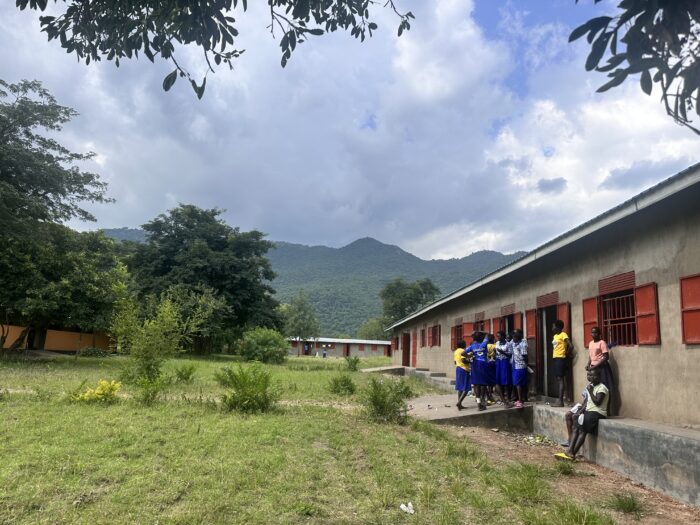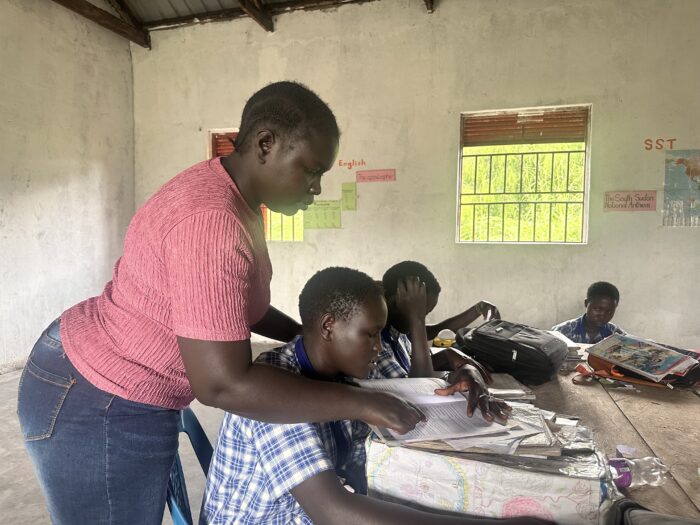From a cash transfer beneficiary to an aspiring businesswoman—the story of Brenda
November 4, 2025 4:42 pm
Kuwa Primary School- Ms. Brenda’s Former School
In Lorogela, a remote village of Budi County, Eastern Equatoria State in South Sudan, the mountains and hills cradle the slopes where children of the land go to school. On a cold morning after a night of heavy rains, muddy roads filled with people heading to various activities.
Among them, a few children clutch books as they make their way to school, while many others head to mining sites to help their parents—an activity that has drawn countless school-age children away from education.
In this region of South Sudan, where access to education is limited and societal pressures often push young girls towards early marriage, Brenda Georgia Lochok’s story shines as a beacon of resilience, hope and transformation.
Growing up in a community where few girls complete secondary school, Brenda faced the harsh realities of inadequate educational infrastructure and cultural norms that rarely supported girls’ ambitions. But in 2014, her life took a pivotal turn when she became a beneficiary of the Girls’ Education South Sudan (GESS) Cash Transfer programme. These cash transfers are provided to children enrolled in and regularly attending eligible classes.
With this support, Brenda was able to purchase essential school supplies such as school uniform, books, sanitary products, and afford examination fees—that would have otherwise been out of reach and may have resulted in her dropping out of school. Her determination went even further. She wisely invested the remaining funds into a small snack business where she made and sold mandazi (a local cake-like snack made using wheat flour, salt or sugar and cooking oil) during school holidays, which helped support her family and eased their financial burden.
Throughout her school years, Brenda received the GESS Cash Transfers six times, each time eagerly anticipating the next. “The money helped me a lot,” Brenda shares. “I would reserve part of it to run a small snack business during the holidays so I could afford more sanitary products to last me until the next payment.”

Ms Brenda teaching P8 learners in her former primary school
Thanks to the cash transfers and her unwavering determination, Brenda not only completed secondary school but also became a role model in her community. Today, she is a proud university student studying Hospitality and Hotel Management with dreams of starting her own business. “I see that restaurants and hotels in my home county are not good enough. When I finish my studies and get capital, I want to establish a hotel here,” she says with passion and confidence. But Brenda’s impact doesn’t stop at her personal success. During university holidays, she returns to her former school, Kuwa Primary School not as a student, but as a volunteer senior female teacher
Among a staff of over 20 teachers, she is one of only three female teachers, offering young girls a powerful example of what is possible. She mentors, teaches, and advocates for girls who, like her, dream of a future beyond traditional boundaries. “Many girls in the school tell me I am their role model. I advise them to use the money (cash transfers) responsibly and ensure it helps them stay in school and become like me,” she concludes with a smile.
Brenda’s journey is a testament to the power of targeted support and the ripple effect it can create. The GESS Cash Transfers did not just help one girl stay in school—they empowered a future leader, mentor, and changemaker.
To date, GESS has supported over 1.2 million girls and boys with disabilities with cash transfers across South Sudan to remain in school.
To read more about the GESS cash transfers, click here: Cash Transfers : Girls’ Education South Sudan
Categorised in: Cash Transfers, GESS Events, Girls' Education, Human Interest Story